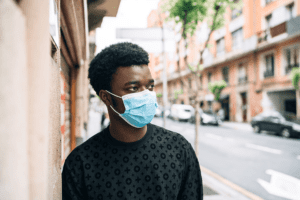Living with alcoholism is already a battlefield. Coping with alcoholism during a global pandemic complicates sobriety. COVID-19 has forced millions into “locking down” in their homes due to job loss, providing home-schooling for children, or health issues. People are dealing with isolation from their friends and family. They find themselves with a lot of extra time on their hands.
Due to the uncertainty of the pandemic, stress and anxiety rise, creating a perfect storm for leaning on unhealthy coping mechanisms to deal with their scary “new normal.” For those already struggling with alcoholism, these changes can be a recipe for disaster.
Alcohol Sales Have Skyrocketed
The American Heart Association reports that alcohol sales in stores have risen dramatically since March 2020. Online sales increased at a whopping rate of almost 500%. Even for homebound individuals, liquor delivery services have the “green light” to bring alcohol to the front door, making temptation even more of an issue.
Polls show that many adults report an increased intake of alcohol since the COVID crisis began. People are now joking about day drinking and a need for “quarantinis.” These jokes can diminish the seriousness of the real struggle with alcoholism.
Using Alcohol as a Band-aid
Life is tough enough trying to juggle bills, relationships, and day-to-day issues. In a post-COVID world, the new burdens can feel almost unbearable. Daily concerns may now include worrying about losing income, adapting to social distancing measures, and taking care of loved ones. Many think that the sum of all these parts is overwhelming.
Increased alcohol consumption may feel like a solution to the stressors of the pandemic. However, alcohol consumption will only complicate the issues a person is trying to avoid. Alcohol is a depressant, which means alcohol only appears to elevate a person’s mood when fighting feelings of depression and hopelessness. Overuse of alcohol and the resulting hangovers can increase feelings of anxiety and stress. Excessive alcohol use can also negatively affect sleep patterns.
While drinking may have initially seemed like a “quick fix,” alcohol use ends up making things much worse. The longer a person uses alcohol to cope, the more challenging it is to walk away from increased drinking. What began as “just a phase” can become full-blown alcoholism.
Are You Just Now Asking Yourself if There’s a Problem?
Many people who struggle with alcohol addiction deny how often they engage in drinking or the seriousness of the problem. For many, COVID-19 has “pulled back the curtains” on the issue of alcoholism. Having regular routines disrupted and an increased amount of free time forced many to face their demons, acknowledging how out of control their drinking has become.
People just now understanding they need help may find taking a first step challenging. One of the first steps to recovery can be making an appointment with a medical professional to discuss their options. However, people may push an appointment back to when things are normal again, despite the uncertainty of returning to normal.
Even People Already in Recovery Are Struggling
Those already taking brave steps of seeking help for their problem have also been affected by the shutdowns. Many people have found that the things they rely on, like support groups, are no longer being held. Even those who have banked months or years of sobriety are finding sobriety challenging during the pandemic. Relapses have become common in the last year due to stressors related to the effects of the pandemic.
Don’t Give Up Hope!
Even if in-person meetings and appointments are not ordinary now, don’t give up on support groups! Many 12-step and other support groups are currently held online. Therapists and other mental health professionals offer assistance via “telehealth,” an appointment on the computer via programs like Zoom and Skype. Physicians often provide “telemedicine” appointments, which allow face-to-face interactions to receive much-needed support without leaving home.
Take a Break from the News
Taking a break from the constant barrage of news coverage of the pandemic can help reduce stress. Spending less time browsing social media and other sites providing a never-ending stream of warnings and death counts can also alleviate stress.
Inpatient Alcohol Treatment During the Pandemic
Most residential treatment programs have adapted their facilities to allow people dealing with alcoholism to continue entering treatment during the pandemic. Elevated cleaning rituals, social distancing, and wearing masks during treatment ensure patients get the help they deserve without worrying about added health risks.
Contact your insurance to see what coverage they offer. If insurance is not an option, treatment facilities may help you facilitate choices for private pay, including loans. There is help for alcoholism, regardless of COVID-19.
Many difficult situations have developed during this past year of life in a pandemic. One of the most problematic is the rise of alcohol sales and the increased amount of drinking people use to cope with a COVID-19 world. Even people with long periods of sobriety find staying in recovery challenging while navigating this uncharted territory. Avalon Malibu can help those attempting to enter recovery for the first time or those who have experienced a relapse. We offer comprehensive evaluations to determine the best treatment plan for you. Our staff can also guide you through each step of your treatment journey. Your recovery team will help you identify individual treatment goals, address personal obligations, and help you establish a new life that leaves alcohol behind. Call us today at











